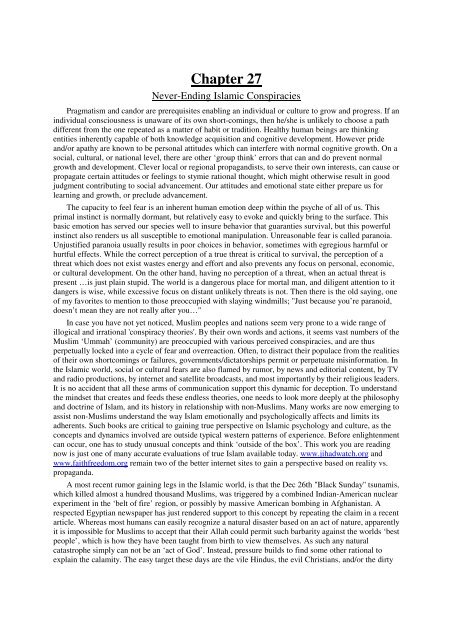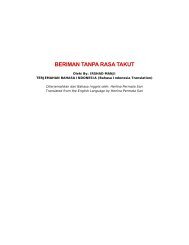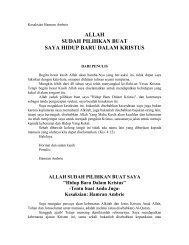A Critical Analysis of 'Real Islam'. Its People ... - Bukti dan Saksi
A Critical Analysis of 'Real Islam'. Its People ... - Bukti dan Saksi
A Critical Analysis of 'Real Islam'. Its People ... - Bukti dan Saksi
You also want an ePaper? Increase the reach of your titles
YUMPU automatically turns print PDFs into web optimized ePapers that Google loves.
Chapter 27<br />
Never-Ending Islamic Conspiracies<br />
Pragmatism and candor are prerequisites enabling an individual or culture to grow and progress. If an<br />
individual consciousness is unaware <strong>of</strong> its own short-comings, then he/she is unlikely to choose a path<br />
different from the one repeated as a matter <strong>of</strong> habit or tradition. Healthy human beings are thinking<br />
entities inherently capable <strong>of</strong> both knowledge acquisition and cognitive development. However pride<br />
and/or apathy are known to be personal attitudes which can interfere with normal cognitive growth. On a<br />
social, cultural, or national level, there are other ‘group think’ errors that can and do prevent normal<br />
growth and development. Clever local or regional propagandists, to serve their own interests, can cause or<br />
propagate certain attitudes or feelings to stymie rational thought, which might otherwise result in good<br />
judgment contributing to social advancement. Our attitudes and emotional state either prepare us for<br />
learning and growth, or preclude advancement.<br />
The capacity to feel fear is an inherent human emotion deep within the psyche <strong>of</strong> all <strong>of</strong> us. This<br />
primal instinct is normally dormant, but relatively easy to evoke and quickly bring to the surface. This<br />
basic emotion has served our species well to insure behavior that guaranties survival, but this powerful<br />
instinct also renders us all susceptible to emotional manipulation. Unreasonable fear is called paranoia.<br />
Unjustified paranoia usually results in poor choices in behavior, sometimes with egregious harmful or<br />
hurtful effects. While the correct perception <strong>of</strong> a true threat is critical to survival, the perception <strong>of</strong> a<br />
threat which does not exist wastes energy and effort and also prevents any focus on personal, economic,<br />
or cultural development. On the other hand, having no perception <strong>of</strong> a threat, when an actual threat is<br />
present …is just plain stupid. The world is a <strong>dan</strong>gerous place for mortal man, and diligent attention to it<br />
<strong>dan</strong>gers is wise, while excessive focus on distant unlikely threats is not. Then there is the old saying, one<br />
<strong>of</strong> my favorites to mention to those preoccupied with slaying windmills; "Just because you’re paranoid,<br />
doesn’t mean they are not really after you…"<br />
In case you have not yet noticed, Muslim peoples and nations seem very prone to a wide range <strong>of</strong><br />
illogical and irrational 'conspiracy theories'. By their own words and actions, it seems vast numbers <strong>of</strong> the<br />
Muslim ‘Ummah’ (community) are preoccupied with various perceived conspiracies, and are thus<br />
perpetually locked into a cycle <strong>of</strong> fear and overreaction. Often, to distract their populace from the realities<br />
<strong>of</strong> their own shortcomings or failures, governments/dictatorships permit or perpetuate misinformation. In<br />
the Islamic world, social or cultural fears are also flamed by rumor, by news and editorial content, by TV<br />
and radio productions, by internet and satellite broadcasts, and most importantly by their religious leaders.<br />
It is no accident that all these arms <strong>of</strong> communication support this dynamic for deception. To understand<br />
the mindset that creates and feeds these endless theories, one needs to look more deeply at the philosophy<br />
and doctrine <strong>of</strong> Islam, and its history in relationship with non-Muslims. Many works are now emerging to<br />
assist non-Muslims understand the way Islam emotionally and psychologically affects and limits its<br />
adherents. Such books are critical to gaining true perspective on Islamic psychology and culture, as the<br />
concepts and dynamics involved are outside typical western patterns <strong>of</strong> experience. Before enlightenment<br />
can occur, one has to study unusual concepts and think ‘outside <strong>of</strong> the box’. This work you are reading<br />
now is just one <strong>of</strong> many accurate evaluations <strong>of</strong> true Islam available today. www.jihadwatch.org and<br />
www.faithfreedom.org remain two <strong>of</strong> the better internet sites to gain a perspective based on reality vs.<br />
propaganda.<br />
A most recent rumor gaining legs in the Islamic world, is that the Dec 26th "Black Sunday" tsunamis,<br />
which killed almost a hundred thousand Muslims, was triggered by a combined Indian-American nuclear<br />
experiment in the ‘belt <strong>of</strong> fire’ region, or possibly by massive American bombing in Afghanistan. A<br />
respected Egyptian newspaper has just rendered support to this concept by repeating the claim in a recent<br />
article. Whereas most humans can easily recognize a natural disaster based on an act <strong>of</strong> nature, apparently<br />
it is impossible for Muslims to accept that their Allah could permit such barbarity against the worlds ‘best<br />
people’, which is how they have been taught from birth to view themselves. As such any natural<br />
catastrophe simply can not be an ‘act <strong>of</strong> God’. Instead, pressure builds to find some other rational to<br />
explain the calamity. The easy target these days are the vile Hindus, the evil Christians, and/or the dirty





